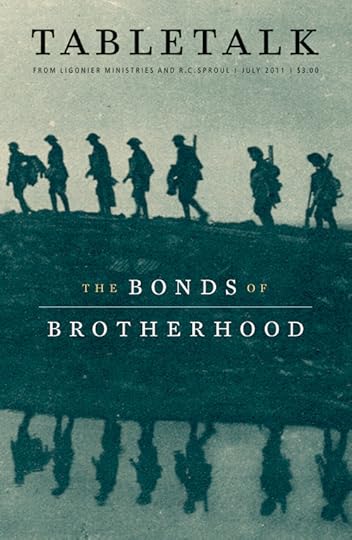R.C. Sproul's Blog, page 580
July 1, 2011
Columns from Tabletalk Magazine, July 2011
The July edition of Tabletalk is out. It examines the need for fostering fraternity and real friendship within the community and the church. We analyze the New Testament’s clear call for men to experience solidarity with men and women to enjoy closeness with women. Contributors include R.C. Sproul, John Piper, Matt Chandler, Mike Pohlman, Jason Stellman, David Temples, and R.C. Sproul Jr.
 We do not post all of the feature articles or the daily devotionals from the issue, so you'll have to subscribe to get those. But for now, here are links to a few select columns and articles from this month:
We do not post all of the feature articles or the daily devotionals from the issue, so you'll have to subscribe to get those. But for now, here are links to a few select columns and articles from this month:
"A Generation of Heroes" by Burk Parsons
"The Bonds of Brotherhood" by R.C. Sproul
"A Culture of Sacrifice" by David Temples
"A Sacrificial Ethic" by Jason Stellman
"The Gospel and the Oncology Waiting Room" by Mike Pohlman
"Don't Waste Your Cancer: An Interview with Matt Chandler"
"Who Is My Brother?" by R.C. Sproul Jr.
"Amazing Love" by John Piper
*****
If you have not subscribed yet, you should. It's only $23 for a year, and $20 to renew. You save even more if you get a 2- or 3-year subscription (as little as $1.36 per issue). Special discounts for churches or businesses are available for those who want multiple copies of each issue. Start receiving Tabletalk by calling one of Ligonier Ministries' resource consultants at 800-435-4343 (8am-8pm ET, Mon-Fri) or subscribe online.

$5 Friday: Suffering, Prayer, Apologetics & More
Find $5 Friday resources this week covering suffering, the Puritans and reformers on prayer, sex, apologetics, family life, and the five solas. Taking Hold of God provided this week courtesy of Reformation Heritage Books. Sale starts today at 8 a.m. and ends Saturday at 8 a.m. EST.

June 30, 2011
The Rest of the Story
"Obedience is a rather narrow road. Disobedience, on the other hand, has a great, sweeping plain of options. Because we are like the Pharisees, we find it easy to convert the law of God into sundry sins of omission. We’re much better at not doing what we’re not supposed to do than we are at doing what we’re supposed to do. Thus, we reduce the Sabbath to all the things we’re not allowed to do. We work at fine-tuning the definition of “work” so we can make sure we don’t do it on the Sabbath. In so doing, as is our wont, we miss the point. Were we to divide the Ten Commandments not according to duties toward God and duties toward man, as many do, but instead on the basis of prohibitions and commands, the Sabbath commandment would end up with the commands. It is less about what we are forbidden to do and more about what we are commanded to do."
There is a right way to keep the Sabbath in our cultural context, and in this article from the June issue of Tabletalk, Dr. R.C. Sproul Jr. points us to the key question we will each need to ask.
Read about it in The Rest of the Story.

June 29, 2011
Get Dr. Sproul's Series on Biblical Wisdom for a Donation of Any Amount
What do you do when you lose your job? When your spouse betrays you? When the news of the world causes great anxiety? All of us deal with different difficult problems. The question is, how will we respond? In Dealing with Difficult Problems, Dr. Sproul offers wise biblical counsel to help us as we face life’s difficulties, pointing us to the sovereignty of God and the sufficiency of Christ.
 This week you can get this CD series for a donation of any amount. Messages include:
This week you can get this CD series for a donation of any amount. Messages include:
Knowing the Will of God
Understanding Suffering
How to Deal with Guilt
Forgiveness
How to Deal with Anxiety
How to Deal with Anger
Offer valid through July 3rd. Donate Now .

A Tale of Two Cities

It is good, important, nay vital that we never grow dim sighted with respect to our own sin. Gospel courage is that ability to look unflinchingly into the mirror of the Word that shows how hideous we are. We all still see only dimly, but in a grand irony, the more we grow in grace, the more we mature, the less spotted we become, the more clear the mirror becomes and the more of our ugliness we see. The more deeply we look into our sins, however, the more we understand and give thanks for His grace.
That said, it is likewise fitting and appropriate that we should celebrate that grace that not only justifies us, but sanctifies us. That is, we are actually getting better, and we do ourselves and the kingdom no favor if we piously seek to deny that gospel truth. We are getting better, and it shows. We get better still when we rejoice over how we are getting better.
Last week I had the privilege of addressing the Christian Home Educators of Colorado multiple times at their annual convention. I enjoyed my time, and was warmly welcomed. I was encouraged the whole time I was there. When the convention ended, however, I left the sheltered confines of this Christian homeschooling crowd and ventured out to a local restaurant. The contrast was shocking.
One group was busy working and learning; the other was busy forgetting and consuming. One group was joyful and peaceful; the other was sullen and crass. One group was gentle spirited and modest; the other was harsh and aggressively sexual. One group looked like the City of God; the other the City of Men. The power of the Holy Spirit in the lives of the Christians was undeniable. The absence of that power in the world was likewise undeniable.
I am well aware, as a sinful Christian, that Christians sin. I am in turn aware that every human being still bears the remnants of the image of God. But it would be the worst form of political correctness to suggest a moral equivalency between the church and the world. All people are sinners and all people bear God’s image. The church is not made up of good people, but repentant people. But it is also made up of people who are indwelt by the Holy Spirit, who are growing in grace and wisdom, who are not only forgiven, but who are being cleansed (I John 1:9). We are not showing our piety but our ingratitude for the work of the Spirit in us when we deny that we have been and are being changed.
My goal here in turn isn’t to dial up our pride within the church. It is instead to encourage us that we are on the right path, and better still, to push us to greater gratitude for how God is working in us. We ought also to be encouraged in this--not only are we all being sanctified, made more like our Lord and Savior, but we are seeing what I call progressive familial sanctification. Our children, collectively, are doing so much better than we. The gospel is at work in our families. May He make more clear the glory of His Son and His gospel in our children’s children and beyond.

June 28, 2011
The Perils and Promise of Social Media
"Church leaders today find themselves caught between two equally valid but competing realities. Social media have become valuable, even necessary, tools for teaching and exercising leadership. Yet Facebook, Twitter, YouTube, and blogs cannot substitute for the local church, which is a living testimony to Jesus Christ. Striking the right balance requires wisdom and discernment to prioritize the local church while learning the strengths and weaknesses of social media."
Indeed. Collin Hansen continues his article from this month's edition of Tabletalk by saying, "Awkwardly co-existing, the real and virtual worlds undoubtedly shape one another. Look no further than the recent resurgence of Calvinism among younger evangelicals. Whereas Calvinists outside the confessional denominations once found fellowship by attending occasional conferences and swapping sermon cassettes, they now have unfettered access to a supportive and boisterous community online, enjoying a large virtual network of like-minded thinkers."
Read the rest at "The Perils and Promise of Social Media."

June 27, 2011
Ideas Have Consequences

In 1948 the brilliant Richard Weaver penned his important book Ideas have consequences. In this book Weaver demonstrated the moving worldviews of the day and showed where they were taking us. Weaver was trying to articulate the big ideas that shape our culture. In the last 25 years several Christian thinkers have focused on different angles of this issue.
R.C. Sproul's penned Lifeviews 25 years ago . It is an excellent examination of secularism, existentialism, humanism, pragmatism, hedonism and much more.
The late Dave Breese wrote Seven Men Who Rule the World from the Grave in 1990. This is a fine introductory overview of the worldviews of Darwin, Marx, Wellhausen, Dewey, Keynes, Kierkegaard and Freud.
The British Roman Catholic Paul Johnson published Intellectuals in 1988 focusing on the philosophies of Marx, Sartre, Tolstoy, Brecht, Ibsen, Rousseau, Bertrand Russell and their (often rancid) personal lives.
Dr. Benjamin Wiker has added to this catalog of titles with his brief (260 pages) and eminently readable tome 10 Books That Screwed Up the World (and 5 Others That Didn't Help), herafter 10/5.
Wiker is a Roman Catholic theologian and apologist, and his Catholic theology does show up in certain portions of the book. But, what makes 10/5 so helpful is that it is like a Great Books course in one book! Instead of just focusing on the men/women (like Breese or Johnson) OR on the "idea" (like pragmatism), Wiker zooms in on the specific work that has wrought so much damage. So, In his examination of Machiavelli's The Prince, Wiker demonstrates the foundations of practical atheism in the public square. When Wiker puts the magnifying glass on Descartes' Discourse on Method, he not only shows how flawed Descartes' skepticism is, but shows the horrible fruit it produced (namely, subjectivism).
In several following chapters Wiker gives a fine introductory overview of:
Rousseau's Discourse on the Origin and Foundations of Inequality among men
Marx's The Manifesto of the Communist Party
Darwin's The Descent of Man
Nietzsche's Beyond Good and Evil
Margaret Sanger's The Pivot of Civilization
Freud's The Future of an Illusion
Margaret Mead's Coming of Age in Samoa
Alfred Kinsey's Sexual Behavior in the Human Male
Betty Friedan The Feminine Mystique
One of the fascinating running themes of 10/5 is how often Wiker points out that the disciples of these "masters" do NOT want the founder of the movement cited! In the case of Margaret Sanger (who was the founder of Planned Parenthood), the organization she founded distances themselves from her racist and eugenic writings. And the Kinsey Institute regularly refuses permission to quote the writings of its founder!
This book can and should be read by evangelicals with great profit. A caveat: 10/5 is long on description, but short on rebuttal and prescription. For that, you're going to need to look elsewhere.
Rev. Carl Robbins is senior minister of Woodruff Road Presbyterian Church in Simpsonville, South Carolina.

June 26, 2011
Twitter Highlights (6/26/11)
Here are some highlights from the various Ligonier Twitter feeds over the past week.

Ligonier If the God you believe in is not a sovereign God, then you really don't believe in God. -R.C. Sproul

Reformation Trust We are not afflicted by chance, but through the infallible providence of God. -John Calvin http://bit.ly/kofEvr

Tabletalk Magazine "It is startling how many there are "who despise Christianity without having the faintest notion what it is." - D. Sayers

Ligonier How we treat God's name reflects how we feel about Him. -R.C. Sproul

Reformation Trust [Regeneration] is like pregnancy; no one is almost pregnant. Likewise, no one is almost regenerate. You either are or you aren’t. -RC Sproul

Ligonier ...a god who is all love, all grace, all mercy, no sovereignty, no justice, no holiness, no wrath...That god is an idol. -R.C. Sproul

Reformation Bible College "I will love Thee, O Lord and thank Thee.... because Thou hast forgiven me these so great and heinous deeds of mine" -Augustine
You can also find our various ministries on Facebook:
Ligonier Ministries | Ligonier Academy | Reformation Bible College
Reformation Trust | Tabletalk Magazine

June 25, 2011
Biblical Economics
My husband read Biblical Economics and learned much. What is your opinion about giving back our rental/investment property to the bank as a foreclosure?
Not long ago I received another interesting question related to our current economic hardships. A friend wondered if investing in Iraqi currency in anticipation of a steep devaluing of that currency was legitimate. I explained an important but often overlooked element of economics (which also touches on oil speculation and even ticket scalping)--the economic value of sharing risk. If I buy Iraqi denari at x and turn around and sell then at 10x I have not profited illegitimately but have shared in risk that provides genuine economic benefit to the whole Iraqi economy. (Of course I cannot cry if I sell x for a loss either.)
What has that to do with foreclosures? Possibly everything. First let’s cover the easy part. If you agreed, in taking a loan, to pay back that loan, you have an obligation to pay back that loan, whatever might have happened to the value of what you bought with the borrowed money. In this kind of situation that loaning institution is not sharing in the risk. They are simply supplying capitol and you are serving as the risk taker.
But suppose that the language of the loan agreement says something like this--you may either pay back the loan, or you may give the collateral/home back to the lending institution, and lose whatever money you might have put down. In this instance the bank is sharing in the risk of your investment. There is no shame in turning over the keys.
Where it gets fuzzy is when this relationship is not made clear. Consider, for an odd analogy, the game of basketball. Suppose you are a conscientious Christian who desires at all times to abide by the rules. Suppose your team is down just a few points in the waning seconds. The odds say your best bet is to put one of your opponents on the foul line. Do you foul him? Is the foul simply a trade for free-throws, or are the free-throws a punishment for wrong-doing? If the former, certainly you are free to foul. If the latter, even if it costs you the game, you are duty bound not to foul. You cannot do wrong (foul) that good (winning the game) may come.
In these difficult times it is all too tempting to take advantage of systems designed outside a Christian perspective. Bankruptcy is one example. Trading in the keys on an upside down house may be another. At the end of the day, however, the Christian is called, in good times and bad, to let his yay be yay and his nay be nay. If I promised to pay, I pay, even to my own hurt. It is fair, however, to consider what I actually agreed to do. I know many Christians are frustrated in their attempts to talk over their agreements with banks, which won’t begin that process until the Christian first begins to not pay on the loan. Here I would argue we keep our vows to our hurt. We don’t miss payments in order to start a conversation on a short sale or a foreclosure. If they won’t renegotiate as long as we pay, we keep paying.
These matters, in short, are not terribly complicated. We do what we promised to do, and everything will be okay. We need to have faith to believe God sees and honors our integrity.

June 24, 2011
Divine Sovereignty
The sovereignty of God is not a secondary doctrine that is relegated to an obscure corner in the Bible. Rather, this truth is the very bedrock doctrine of all Scripture. This is the Mount Everest of biblical teaching, the towering truth that transcends all theology. From its opening verse, the Bible asserts in no uncertain terms that God is and that God reigns. In other words, He is God—not merely in name, but in full reality. God does as He pleases, when He pleases, where He pleases, how He pleases, and with whom He pleases in saving undeserving sinners. All other doctrines of the Christian faith must be brought into alignment with this keystone truth.
The sovereignty of God is the free exercise of His supreme authority in executing and administrating His eternal purposes. God must be sovereign if He is to be truly God. A god who is not sovereign is not God at all. Such is an imposter, an idol, a mere caricature formed in man’s fallen imagination. A god who is less than fully sovereign is not worthy of our worship, much less our witness. But the Bible proclaims for all to hear that “the Lord reigns” (Ps. 93:1). God is exactly who Scripture declares He is. He is the sovereign Lord of heaven and earth, whose supreme authority is over all. This is the main premise of Scripture.
Nowhere is God’s sovereignty more clearly demonstrated than in His salvation of the lost. God is free to bestow His saving mercy on whom He pleases. God says, “I will be gracious to whom I will be gracious, and will show mercy on whom I will show mercy” (Ex. 33:19b; Rom. 9:15). He is not obligated to extend His grace to any undeserving sinner. If He were to choose to save none, He would remain perfectly just. He might determine to save a few and still be absolutely holy. Or He could choose to save all. But God is sovereign, and that means He is entirely free to bestow His grace however He will—whether on none, few, or all.
From beginning to end, salvation is of God and, ultimately, for God. The apostle Paul writes, “From him and through him and to him are all things” (Rom. 11:36). In this comprehensive verse, God is declared to be the divine source, the determinative means, and the designated end of all things. This is most true in salvation. According to this text, every aspect of the operation of saving grace is God-initiated, God-directed, and God-glorifying. Every dimension of salvation is from Him, through Him, and to Him. This is to say, salvation originates from His sovereign will, proceeds through His sovereign activity, and leads to His sovereign glory.
From beginning to end, salvation is of God and, ultimately, for God.
Excerpted from Pillars of Grace.

R.C. Sproul's Blog
- R.C. Sproul's profile
- 1968 followers




